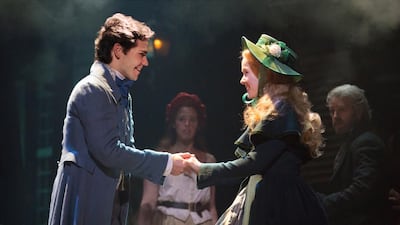Since 2006, Les Misérables has had the honour of being the world's longest-running musical. And despite celebrating its 30th anniversary last year, the juggernaut continues to thunder on.
This week a celebrated new touring version, from London’s West End, arrives at Dubai Opera, boasting a sprinkling of tweaks and improvements to the original show.
Its longevity and enduring popularity are remarkable achievements – so what is the secret to the Les Mis success story? That is the multimillion-dollar question, the answer to which lies somewhere at the end of a rainbow – and every musical-theatre impresario has been trying to find it since the show's debut in the 1980s.
One thing is certain: everything about Les Misérables screams "huge". Each performance features 392 costumes made up of 1,782 items of clothing. There are approximately 101 members of the cast and crew.
More than 70 million people have seen it in 44 countries and in 22 languages including Mauritian creole, Icelandic and Japanese. At the last count a few years ago, that adds up to a staggering 53 million tickets.
Then there’s the drama, which is played out at a fever pitch of emotion.
"It's all about Victor Hugo's story," says Sir Cameron Mackintosh, the show's producer and a man as important to the Les Misérables success story as writers Alain Boublil, Jean-Marc Natel and Herbert Kretzmer, who between them wrote the French and English lyrics, and Claude-Michel Schönberg, who wrote the music.
“Sometimes I think: ‘I can’t possibly watch more than 10 minutes tonight’ – and I find myself 45 minutes later completely drawn into it.
“And it’s a story that’s entirely contemporary because it’s a brilliant observation of human nature.”
Victor Hugo’s book of the same name, first published in 1862, is a hefty, labyrinthine affair set during the 1832 June rebellion in Paris.
At the heart of the book lies a complexity and sense of contradiction, an aspect of human nature that Hugo, the 19th-century Romantic, purposely drew out.
Of course, complexity does not suit musical theatre. So the genius in the stage adaptation is the show’s ability to focus on and amplify the bigger emotions, rather than those that are complicated or ambivalent.
Once stripped back and simplified, the universal subjects of justice and love ring out and lift the audience.
This is a technique that borrows from opera — and it wasn’t the only one the writers took advantage of.
A classic argument against opera is the absurdity of having characters singing their every thoughts and emotions. Les Misérables is likewise sung throughout, a feature that set it apart from the preceding — largely American — trend in musical theatre, where spoken dialogue is interspersed by the songs (or "numbers").
But in Les Mis, the continual high intensity of the emotion somehow lends itself to song. This was perhaps highlighted for a wider audience in 2009, when Britain's Got Talent TV contestant Susan Boyle shot to fame online when the unlikely Scottish singer's audition version of I Dreamed a Dream went viral.
The song gave Boyle a way to express her own dream of becoming a famous singer, as well as showcase her impressive voice.
Fascinatingly, even as the song turned Boyle into a global star, her performance also helped to make Les Misérables an even bigger success.
“The show had been doing pretty well but it definitely jumped up there,” Mackintosh said of the Boyle effect. “This ricocheted around the world and it was the publicity shot anyone would dream of — although, of course, it would never happen if you tried to make it a publicity stunt.”
The stage show’s mind-boggling success was far from assured at the start, and the story of its conception is almost as complicated as that of the source novel.
It started out as a cheaply recorded concept album, in French written by Schönberg (music) and Boublil (words). This was followed by a stage adaptation that had a short run in Paris.
It was only when Mackintosh was invited to bring the show to the UK and created an English-language version (with text by Kretzmer), which was produced by the Royal Shakespeare Company in October 1985, that the hit we know today took shape.
Not that you would have guessed how successful it would become from the early reviews. British newspaper The Observer described it as "witless and synthetic entertainment". City Limits magazine complained that it was a "load of sentimental old tosh", adding: "If I was the RSC I'd forget about a West End transfer and settle for a made-for-TV American mini-series."
The runaway success was really set in motion when the show transferred to London’s West End in December 1985. It opened on Broadway in New York in March 1987. The rest, as they say, is history.
Les Misérables has gone on to contribute significantly to Mackintosh's reported £675 million (Dh3bn) fortune (aided by his other stage hits, including Cats, The Phantom of the Opera, Oliver! and Mary Poppins). An Oscar-winning film adaptation was released in 2012.
Today, the show’s evolution continues. The version coming to Dubai has an updated orchestration that jettisons the cheesy 1980s synths, and the set has been tweaked to include illustrations by Hugo himself.
But what has not fundamentally changed is the music — arguably the true secret behind the show’s success. Those memorable tunes get into your head and just don’t come out.
• Les Misérables will be performed at Dubai Opera from Thursday, November 10 until December 2. Tickets begin from Dh275 from www.dubaiopera.com
artslife@thenational.ae

